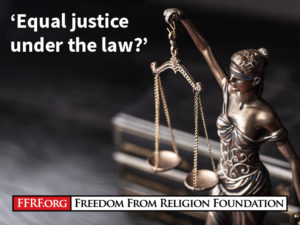Court brief takes on anti-trans Indiana public school teacher

The Freedom From Religion Foundation is filing an appeals court brief on behalf of the Secular Student Alliance, in support of an Indiana school district’s actions to rein in discrimination against transgender students by a religious music teacher.
After Brownsburg High School music teacher John Kluge sought to avoid using the name of a transgender student, the school agreed he could call students by their last names only. The parent of a transgender student noted that the teacher continued to call her child “Miss,” causing her child “a lot of distress.” Other students complained regularly that the practice made them uncomfortable. The Brownsburg Community School Corporation subsequently revoked the last-name policy and the teacher brought a religious discrimination claim against the district, saying that the school system failed to accommodate him. The district court ruled in favor of the school district. Kluge has appealed to the 7th U.S. Circuit Court of Appeals.
FFRF filed a brief before the appeals court yesterday, on behalf of the Secular Student Alliance, reflecting concerns about how students are impacted by religiously-motivated conduct from teachers.
First, the brief argues that the court should consider unique aspects of the educational environment when analyzing undue hardship. The teacher’s request not to use students’ first names occurs within the context of a public education system, which has important responsibilities to students. Public school teachers have a position of power and responsibility that they need to exercise in the most proper manner. Plus, students are subject to compulsory education laws, such as mandatory school attendance.
Second, the brief maintains, schools may limit a teacher’s religiously motivated behavior in the classroom due to both pedagogical concerns and potential to harm students. It is especially problematic that the “last names” accommodation requested by the teacher would put a burden on students, rather than the employer. School districts must be careful to ensure that students feel welcome in the school environment. Employer concerns relating to relationships are especially acute when the employee has a position of authority.
Relatedly, the teacher argues that student “grumblings” are not sufficient to justify Brownsburg’s denial of his accommodation request. This type of negative reaction to an accommodation is precisely what demonstrates the burden placed on students, since students have complained numerous times about how he was treating them. Brownsburg has legitimate pedagogical concerns, as well as concerns for the potential harm to students with his requested accommodation, FFRF underscores. These aren’t theoretical concern: The teacher’s use of last names has harmed students and caused distress, to the point where a student felt singled out, dropped out of orchestra and transferred out of the high school altogether.
“Public schools, and their teachers, hold a unique role in our society,” FFRF’s brief concludes. “Students themselves are mandated by law to attend and are placed under the authority of a teacher, whom school officials have an interest in regulating to achieve the school’s educational mission.”
That’s why, FFRF contends, the judgment of the district court should be affirmed.
